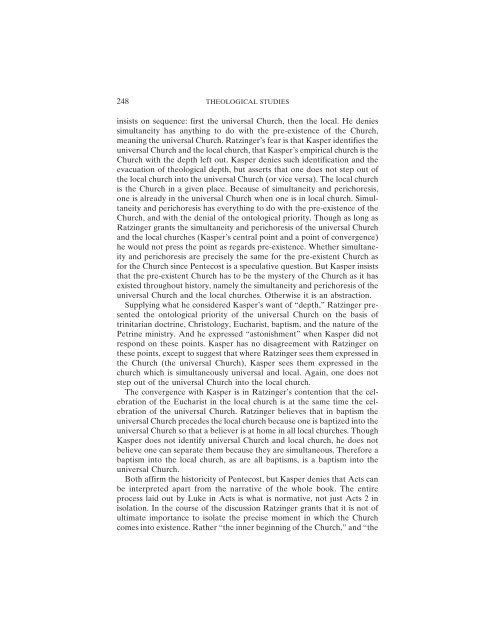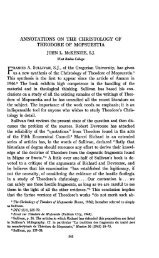the ratzinger/kasper debate - Theological Studies
the ratzinger/kasper debate - Theological Studies
the ratzinger/kasper debate - Theological Studies
Create successful ePaper yourself
Turn your PDF publications into a flip-book with our unique Google optimized e-Paper software.
248 THEOLOGICAL STUDIES<br />
insists on sequence: first <strong>the</strong> universal Church, <strong>the</strong>n <strong>the</strong> local. He denies<br />
simultaneity has anything to do with <strong>the</strong> pre-existence of <strong>the</strong> Church,<br />
meaning <strong>the</strong> universal Church. Ratzinger’s fear is that Kasper identifies <strong>the</strong><br />
universal Church and <strong>the</strong> local church, that Kasper’s empirical church is <strong>the</strong><br />
Church with <strong>the</strong> depth left out. Kasper denies such identification and <strong>the</strong><br />
evacuation of <strong>the</strong>ological depth, but asserts that one does not step out of<br />
<strong>the</strong> local church into <strong>the</strong> universal Church (or vice versa). The local church<br />
is <strong>the</strong> Church in a given place. Because of simultaneity and perichoresis,<br />
one is already in <strong>the</strong> universal Church when one is in local church. Simultaneity<br />
and perichoresis has everything to do with <strong>the</strong> pre-existence of <strong>the</strong><br />
Church, and with <strong>the</strong> denial of <strong>the</strong> ontological priority. Though as long as<br />
Ratzinger grants <strong>the</strong> simultaneity and perichoresis of <strong>the</strong> universal Church<br />
and <strong>the</strong> local churches (Kasper’s central point and a point of convergence)<br />
he would not press <strong>the</strong> point as regards pre-existence. Whe<strong>the</strong>r simultaneity<br />
and perichoresis are precisely <strong>the</strong> same for <strong>the</strong> pre-existent Church as<br />
for <strong>the</strong> Church since Pentecost is a speculative question. But Kasper insists<br />
that <strong>the</strong> pre-existent Church has to be <strong>the</strong> mystery of <strong>the</strong> Church as it has<br />
existed throughout history, namely <strong>the</strong> simultaneity and perichoresis of <strong>the</strong><br />
universal Church and <strong>the</strong> local churches. O<strong>the</strong>rwise it is an abstraction.<br />
Supplying what he considered Kasper’s want of “depth,” Ratzinger presented<br />
<strong>the</strong> ontological priority of <strong>the</strong> universal Church on <strong>the</strong> basis of<br />
trinitarian doctrine, Christology, Eucharist, baptism, and <strong>the</strong> nature of <strong>the</strong><br />
Petrine ministry. And he expressed “astonishment” when Kasper did not<br />
respond on <strong>the</strong>se points. Kasper has no disagreement with Ratzinger on<br />
<strong>the</strong>se points, except to suggest that where Ratzinger sees <strong>the</strong>m expressed in<br />
<strong>the</strong> Church (<strong>the</strong> universal Church), Kasper sees <strong>the</strong>m expressed in <strong>the</strong><br />
church which is simultaneously universal and local. Again, one does not<br />
step out of <strong>the</strong> universal Church into <strong>the</strong> local church.<br />
The convergence with Kasper is in Ratzinger’s contention that <strong>the</strong> celebration<br />
of <strong>the</strong> Eucharist in <strong>the</strong> local church is at <strong>the</strong> same time <strong>the</strong> celebration<br />
of <strong>the</strong> universal Church. Ratzinger believes that in baptism <strong>the</strong><br />
universal Church precedes <strong>the</strong> local church because one is baptized into <strong>the</strong><br />
universal Church so that a believer is at home in all local churches. Though<br />
Kasper does not identify universal Church and local church, he does not<br />
believe one can separate <strong>the</strong>m because <strong>the</strong>y are simultaneous. Therefore a<br />
baptism into <strong>the</strong> local church, as are all baptisms, is a baptism into <strong>the</strong><br />
universal Church.<br />
Both affirm <strong>the</strong> historicity of Pentecost, but Kasper denies that Acts can<br />
be interpreted apart from <strong>the</strong> narrative of <strong>the</strong> whole book. The entire<br />
process laid out by Luke in Acts is what is normative, not just Acts 2 in<br />
isolation. In <strong>the</strong> course of <strong>the</strong> discussion Ratzinger grants that it is not of<br />
ultimate importance to isolate <strong>the</strong> precise moment in which <strong>the</strong> Church<br />
comes into existence. Ra<strong>the</strong>r “<strong>the</strong> inner beginning of <strong>the</strong> Church,” and “<strong>the</strong>

















